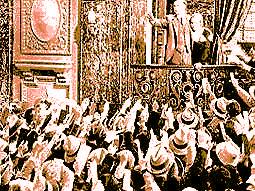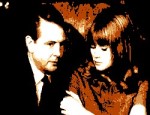Film Review

It's telling that the main character of this film, the honest banker Dickson, is played by Walter Huston, who would portray a Roosevelt-like president in another film, Gabriel Over the White House, the following year. In both of these films (which are obvious paean's for Roosevelt's social and economic reforms), Huston gives a tour de force performance that sizzles with pathos and passion, proving that he was without doubt one of the greatest (and most sympathetic) actors of his generation.
What is most striking about this film is its extraordinary pace. Capra's intention was to convey the sense of blind panic that was prevalent at the time and he achieves this by getting his actors to speak far faster than was normal and by using tracking shots, rapid pans and fast cuts instead of the more familiar slow dissolves. Admittedly the tacky romantic subplot slows things down a little and appears to run against the grain of the film, but even this does not halt the relentless pace, which soon builds to a dizzying crescendo.
Implausible as the ending is, it provides a satisfying resolution to the frenetically paced drama and contains an important moral which continues to resonate. In a period of economic turbulence, the self-interested action of individuals can make things much worse. Capitalism without a sense of public duty is doomed to fail. Capra would echo this sentiment time and again in his films, most effectively in his timeless masterpiece It's a Wonderful Life (1946).
© James Travers 2009
The above content is owned by frenchfilms.org and must not be copied.
Film Synopsis
Senior banking official Thomas Dickson finds himself in a minority of one when his board of directors challenge him to agree to a merger with a New York trust. It is the height of the Great Depression and whilst his directors are of the opinion that the bank should reduce lending and build up its cash reserves, Dickson is adamant that the bank must function as usual. Unless banks like his go on lending to individuals and companies across America, the economic situation will only worsen, resulting in a downward spiral that will ruin everyone. Unbeknown to Dickson, one of his employees, Cluett, has fallen in with some gangsters who, with his help, mount a successful robbery on the bank's vault one evening. The obvious culprit is Brown, a former convict who now works as the bank's chief teller. Brown's fate appears sealed when he refuses to give an account of his whereabouts on the night of the robbery. In fact, on the night in question he paid a visit to Cluett, only to find him in the company of Dickson's wife. Meanwhile, news of the bank robbery has spread like wild fire. Fearing that the bank is heading for ruin, its depositors turn up in droves, demanding to withdraw their money. Dickson's nightmare of a crippling bank run is about to become reality and he faces disaster, unless a miracle happens...© James Travers
The above content is owned by frenchfilms.org and must not be copied.
Similar Films
Here are some other films you may enjoy watching:- Grisou (1938)
- Les Anges du péché (1943)
- Mikaël (1924)
- Where Now Are the Dreams of Youth? (1932)
- Dernière jeunesse (1939)
Other related links:
Film Credits
- Director: Frank Capra, Allan Dwan, Roy William Neill
- Script: Robert Riskin (story)
- Cinematographer: Joseph Walker
- Music: Mischa Bakaleinikoff, Karl Hajos
- Cast: Walter Huston (Dickson), Pat O'Brien (Matt), Kay Johnson (Mrs. Dickson), Constance Cummings (Helen), Gavin Gordon (Cluett), Arthur Hoyt (Ives), Robert Emmett O'Connor (Inspector), Harry C. Bradley (Sampson), Eddy Chandler (Kelly), Berton Churchill (O'Brien), Tom Dugan (Depositor), Sarah Edwards (Gossip on Phone), Robert Ellis (Dude Finlay), Eddie Foster (Depositor), Charley Grapewin (Mr. Jones), Julia Griffith (Gossip on Phone), Sherry Hall (Carter), Sterling Holloway (Oscar), Harry Holman (Loan-Seeker), Anderson Lawler (Charlie)
- Country: USA
- Language: English
- Support: Black and White
- Runtime: 75 min
The very best period film dramas

The very best of the French New Wave

The best French Films of the 1920s
